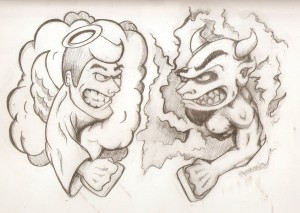Jesus: Son of God part four
QUEST FOR THE HISTORICAL JESUS
Small group devotion
The purpose of this discussion is get your group grappling with what they find hard to believe in the gospels. Can we pick and choose what we want to believe? How do we read scripture?
 Opening discussion: Today we’re looking at a story involving demon exorcism. What are some popular conceptions about demons (and angels)? What is biblically based? What is fabrication?
Opening discussion: Today we’re looking at a story involving demon exorcism. What are some popular conceptions about demons (and angels)? What is biblically based? What is fabrication?
Watch the “Living vlog” posted on 19th October to the Living Room facebook page. Jordan talks about the Quest for the Historical Jesus.
Draw a spectrum. On one end write “literal historical truth”, on the other write “metaphor”. When you read scripture, where do you place yourself on the spectrum and why?
Read Mark 5:1-20. As you listen, focus on the bits that seem unbelievable or at the very least strange.
What parts of the story stand out to you? What parts (if any) do you struggle to believe?
Does the popular conception of demons make it easier or harder to believe? Why or why not?
Go back to the spectrum you drew earlier. What are the problems with both ends of the spectrum? See Leader’s Notes 1.
We live in a world that struggles with talk of the supernatural e.g. miracles, angels, demons. What are some of the main challenges for people today? As Christians, where should we sit? How could have conversations with people who don’t believe in the supernatural?
Leader’s Notes:
- Try and play devil’s advocate here to draw out conversation. A literal reading of scripture does not take seriously the nuance of the text. For instance, the bible contains poems, law, stories, apocalyptic texts etc. How would we read a poem or song differently from law or history? How can a poem be true even if it’s not literally, historically accurate? In the gospels, each of the gospel writers is not only telling history. They are also using a high degree of artistic license to make theological statements about who Jesus is and the significance of what he came to do. This doesn’t mean it’s untrue but neither does it mean everything in the gospels happened historically exactly as its written. A purely metaphorical reading of scripture is also deeply problematic because you risk removing all historical basis. If the incarnation, crucifixion, resurrection, and ascension of Christ is purely metaphorical, how does it actually have any significance in history? What is it grounded in? The fact is, the witness of scripture makes claims unlike anything else in history. The resurrection is beyond the natural laws of science. It is a new act of God. Engaging scripture on its own terms involves confronting the unique historical claims of a God whose eternal life breaks into history.
